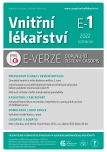-
Medical journals
- Career
Závažné zlyhávanie srdca a arytmia po protinádorovej liečbe podávanej v detstve
Authors: Xénia Faktorová 1; Milan Luknár 2,3; Zuzana Zelinková 1; Lucia Horniaková 4; Eva Mikušková 5; Michal Šašov 6; Mária Szántová 4; Viliam Mojto 4; Beata Mladosievičová 7
Authors‘ workplace: Department of Internal Medicine of the Slovak Medical University, University Hospital – St. Michael’s Hospital, a. s, Bratislava 1; Department of Heart Failure and Heart Transplantation National Institute of Cardiovascular Diseases, Bratislava 2; Department of Cardiology, Faculty of Medicine, Comenius University and National Institute of Cardiovascular Diseases, Bratislava 3; Department of Oncohematology Faculty of Medicine, Comenius University and National Cancer Institute, Bratislava 5; Department of Arrhytmias and Cardiac Stimulation National Institute of Cardiovascular Diseases, Bratislava 6; Institute of Pathological Physiology, Department of Clinical Pathophysiology, Faculty of Medicine, Comenius University, Bratislava 7; rd Department of Internal Medicine, Faculty of Medicine, Comenius University and University Hospital, Bratislava 43
Published in: Vnitř Lék 2022; 68(E-1): 22-26
Category: Case reports
Overview
Cieľom kazuistiky je popísať prípad mladého pacienta, v detstve úspešne liečeného pre non-Hodgkinov lymfóm chemoterapiou s obsahom anthracyklínu doxorubicínu s neskorším rozvojom príznakov závažného kardiovaskulárneho poškodenia 27 rokov od diagnostiky lymfómu. Pacient je dlhodobo v kompletnej remisii onkologického ochorenia. U pacienta bola započatá liečba chronického srdcového zlyhávania v súlade s najnovšími odporúčaniami vrátane implantácie kardioverter-defibrilátora, ako primárnej prevencie náhlej kardiálnej smrti. Momentálne je pacient čakateľom na transplantáciu srdca.
Klíčová slova:
srdcové zlyhávanie – antracyklíny – implantovatelný kardioverter-defibrilátor – arytmia – neskorá kardiotoxicita
Sources
1. Bates JE, Howell RM, Liu Q et al. Therapy‑Related Cardiac Risk in Childhood Cancer Survivors: An Analysis of the Childhood Cancer Survivor Study. J Clin Oncol 2019;37(13):1090 - 1101. DOI: <http://doi.org/10.1200/JCO.18.01764>.
2. Mulrooney DA, Hyun G, Ness KK et al. Major cardiac events for adult survivors of childhood cancer diagnosed between 1970 and 1999: report from the Childhood Cancer Survivor Study cohort. BMJ 2020;368:l6794. DOI: <https://doi:10.1136/bmj.l6794>.
3. Armenian SH, Hudson MM, Mulder RL et al. Recommendations for cardiomyopathy surveillance for survivors of childhood cancer: a report from the International Late Effects of Childhood Cancer Guideline Harmonization Group. Lancet Oncol 2015;16(3):123-136. DOI: <https://doi:10.1016/S1470-2045(14)70409-7>.
4. Haddy N, Diallo S, El‑Fayech C et al. Cardiac Diseases Following Childhood Cancer Treatment: Cohort Study. Circulation 2016;133(1):31-38. DOI: <https://doi:10.1161/CIRCULATIONAHA.115.016686>.
5. Children’s Oncology Group. Data from October 2018. Long‑Term Follow‑Up Guidelines for Survivors of Childhood, Adolescent and Young Adult Cancers, Version 5. 0. Monrovia, CA: Children’s Oncology Group. [2021-02-28]. Retrieved from: <https://www.survivorshipguidelines.org>.
6. Hilfiker‑Kleiner D, Ardehali H, Fischmeister R et al. Late onset heart failure after childhood chemotherapy. Eur Heart J 2019;40(10):798-800. DOI: <http://doi.org/10.1093/eurheartj/ehz046>.
7. Scully RE, Lipshultz SE. Anthracycline cardiotoxicity in long‑term survivors of childhood cancer. Cardiovasc Toxicol 2007;7(2):122-128. DOI: <https://doi:10.1007/s12012-007-0006-4>.
8. Simbre VC, Duffy SA, Dadlani GH et al. Cardiotoxicity of cancer chemotherapy: implications for children. Paediatr Drugs 2005;7(3):187-202. DOI: <https://doi:10.2165/00148581-200507030-00005>.
9. Steinherz LJ, Steinherz PG, Tan C. Cardiac failure and dysrhythmias 6-19 years after anthracycline therapy: a series of 15 patients. Med Pediatr Oncol 1995;24(6):352-361. DOI: <https://doi:10.1002/mpo.2950240604>.
10. Chen Y, Chow EJ, Oeffinger KC et al. Traditional cardiovascular risk factors and individual prediction of cardiovascular events in childhood cancer survivors. J Natl Cancer Inst 2020;112(3):256-265. DOI: <https://doi:10.1093/jnci/djz108>.
11. Cardinale D, et al. Early Detection of Anthracycline Cardiotoxicity and Improvement with Heart Failure Therapy. Circulation 2015;131(22):1981-1988. DOI: <https://doi:10.1161/CIRCULATIONAHA.114.013777>.
12. Hines MR, Mulrooney DA, Hudson MM et al. Pregnancy‑associated cardiomyopathy in survivors of childhood cancer. J Cancer Surviv 2016;10(1):113-121. DOI: <https://doi:10.1007/s11764-015-0457-8>.
13. Wang J, Li J, Kong F et al. Bipolar II disorder as the initial presentation of CADASIL: an underdiagnosed manifestation. Neuropsychiatr Dis Treat 2017;13 : 2175-2179. DOI: <https://doi:10.2147/NDT.S142321>.
14. Lesnik Oberstein SA, Jukema JW, Van Duinen SG et al. Myocardial Infarction in Cerebral Autosomal Dominant Arteriopathy with Subcortical Infarcts and Leukoencephalopathy (CADASIL). Medicine 2003;82(4):251-256. DOI: <https://doi:10.1097/01.md.0000085054.63483.40>.
15. Urbanova D, Bubanska E, Hrebik M, Mladosievicova B. Heart transplant in a childhood leukaemia survivor: a case report. Exp Clin Transplant 2010;8(1):79-81.
Labels
Diabetology Endocrinology Internal medicine
Article was published inInternal Medicine

2022 Issue E-1-
All articles in this issue
- Zanechání kouření a riziko diabetes mellitus 2. typu
- Etické konotace provádění klinických hodnocení léčivých přípravků během pandemie onemocnění covid-19
- Možnosti cvičenia v liečbe ankylozujúcej spondylitídy
- Vyšetření renální funkce v praxi
- Muž s dýmkou, prof. MUDr. Pavel Klener, DrSc., se v dubnu 2022 dožívá 85 let
- Závažné zlyhávanie srdca a arytmia po protinádorovej liečbe podávanej v detstve
- Internal Medicine
- Journal archive
- Current issue
- Online only
- About the journal
Most read in this issue- Vyšetření renální funkce v praxi
- Možnosti cvičenia v liečbe ankylozujúcej spondylitídy
- Zanechání kouření a riziko diabetes mellitus 2. typu
- Závažné zlyhávanie srdca a arytmia po protinádorovej liečbe podávanej v detstve
Login#ADS_BOTTOM_SCRIPTS#Forgotten passwordEnter the email address that you registered with. We will send you instructions on how to set a new password.
- Career

